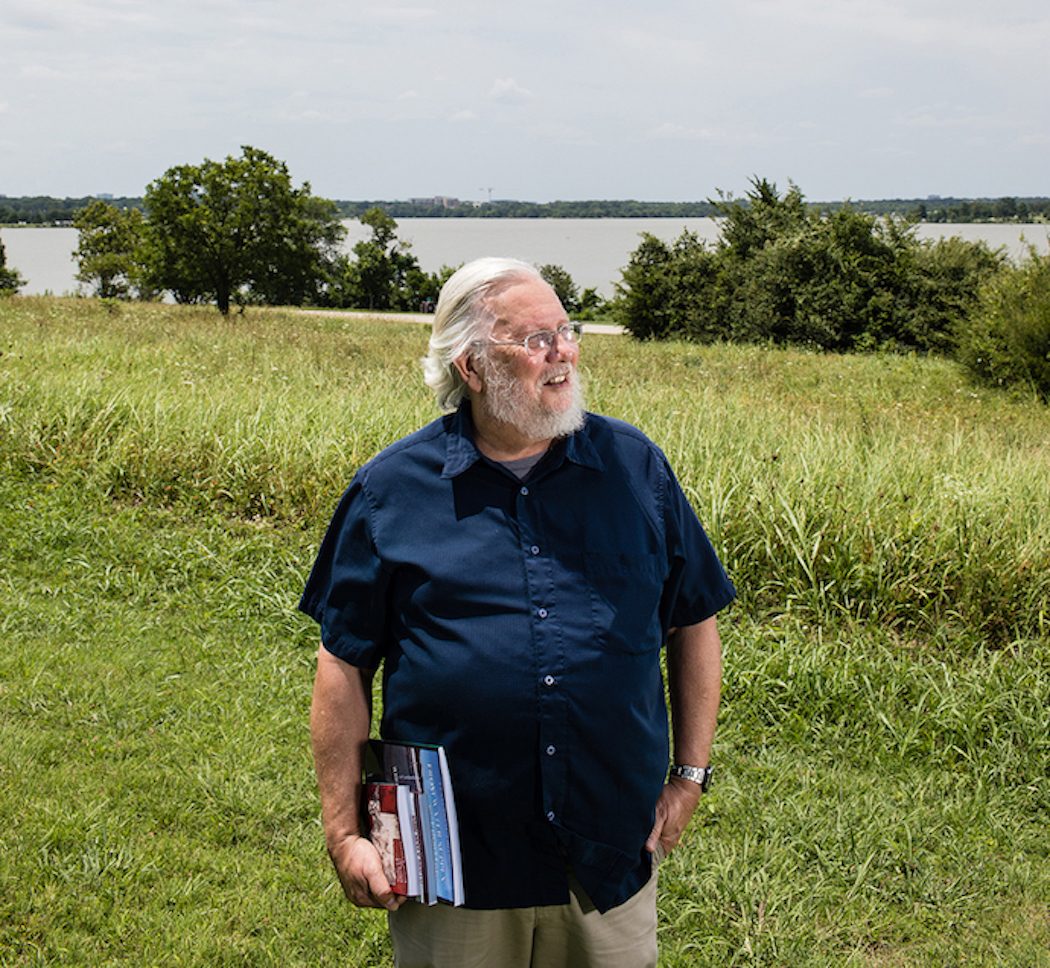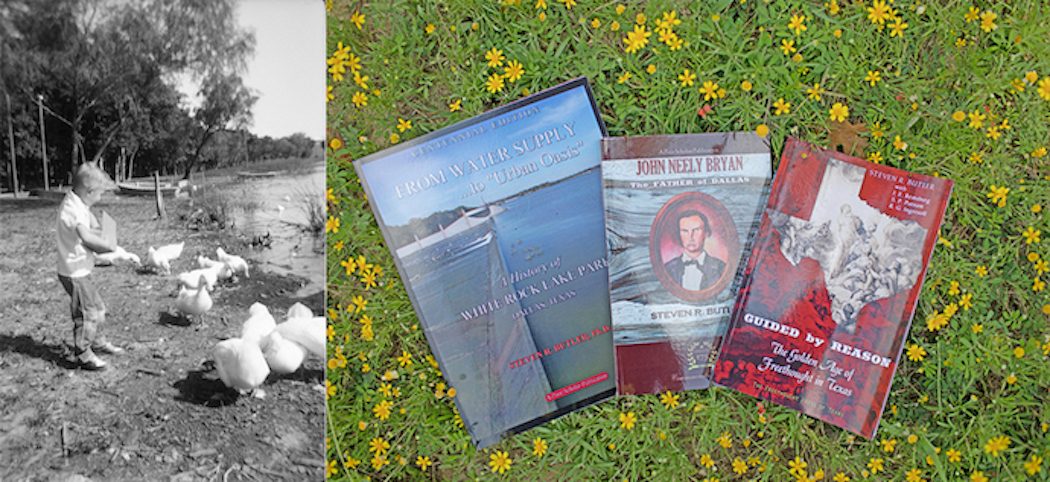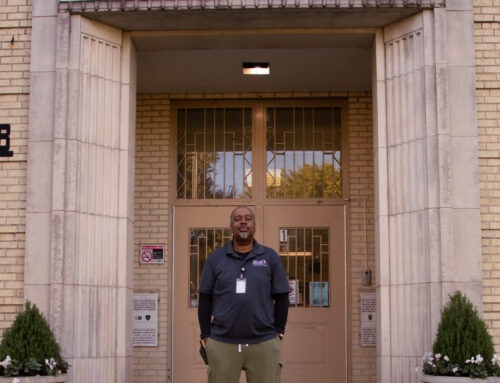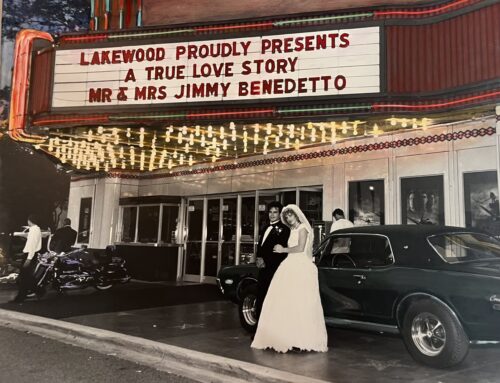
Dr. Steven Butler, White Rock Lake Park Historian and history professor at Richland and Collin County Colleges, stands for preservation of the Bath House Cultural Center’s museum. An ongoing debate still stands for the role of the center between the museum remaining, and the art space expanding over the museum’s real estate. Photo by Rasy Ran.
Holding onto history
If historian Dr. Steven Butler could have dinner with any legendary Dallas figure, his first pick would be George Clifton Edwards, a social activist who advocated for rights for child laborers, minorities and the illiterate.
“[Edwards] was a school teacher but he was fired because of his socialist views,” Butler says. “So he got a law degree.”
Edwards’ first case was defending Allen Brooks, a black man accused of sexual misconduct with a white woman in 1910. They never made it to trial. An angry lynch mob flooded the Old Red Courthouse, throwing Brooks out a second-story window with a rope around his neck before dragging his body through the street and hanging him from a lamppost near Elks Arch. It was a horror the attorney could not shake. He recommitted his life to helping the disenfranchised, specifically laborers and black defendants who didn’t face a fair shot at justice. He became a charter member of the American Civil Liberties Union and an original supporter of the National Association for the Advancement of Colored People.
“He was not racist at a time when most people were terribly racist. He always stood out for his views. He was a Unitarian in a city full of Baptists,” Butler says. “I tend to be drawn to what they call the rebels. Those are my heroes, not the bankers and businessmen.”
That’s always been true of Butler, since he was a young boy growing up in Casa View, where his father worked for Texas and Pacific Railway and his mother was a secretary at the now defunct White Rock Airport. Davy Crockett was the first rebellious historical figure that captured his imagination.
“Every Baby Boomer can sing that song,” he says before launching into a quiet rendition of the classic 1954 television tune, “The Ballad of Davy Crockett.”
But it was a pair of socks that solidified his interest in the past. They were hand-knitted by his great grandmother and worn in battle by his great grandfather during the Civil War.
“That personalized it,” he says.
He suddenly wanted to know the stories of where his great grandfather wore those socks, and whether he returned home safely to his beloved.
“I did trace his time in the Civil War… He got a million-dollar wound,” Butler says. When asked to explain, he adds, “Let’s just say he was shot in the crotch. But he went on to father 14 children so it obviously didn’t do any lasting damage.”
It wasn’t until Butler was himself a father that he began to dig into Dallas’ history. Taking his two young sons to the places where he played as a child, including Flag Pole Hill and the surrounding creeks, he began to realize how little he knew about the history of the area. The history doctorate holder started digging, and was staggered to find that in World War II, German prisoners of war were held on the banks of the lake where he played as a child.
“I said, ‘Are you kidding me?’” he recalls.
The Civilian Conservation Corps, a federal program that sent workmen to build public improvement projects around the lake from 1936-42, fascinated Butler. “I love the history of the New Deal. I look around the lake and see all the things we’re still using today.”
It was the beginning of an obsession. Butler would spend the coming years continuing his dig into the lake, looking for the stories of how it was built and how it became the city’s crown jewel. It culminated in the 2004 book, “From Water Supply to Urban Oasis: A History of White Rock Lake Park.” It whet his appetite for more writing.
He also penned “John Neely Bryan: The Father of Dallas,” the story of one man’s vision of Dallas years before it was a city. Butler was taken by the quiet tragedy of Bryan’s life.
“He had this big idea to build a town or trading post, and then he just kind of gave up on it,” Butler says. “He started one of the biggest cities in America, and it never really benefited him.”
Butler can relate, since writing books is something he does for pure passion, not profit. He’s a one-man operation, even laying out the pages himself.
“I’ve probably spent more [money] on my books than I’ve made,” he says. “I published the [John Neely Bryan] book last year, and no one cared.”
But he cares, deeply, about the figures who helped the city become what it is today. His latest book, “Guided by Reason: The Golden Age of Freethought in Texas,” highlights the progressives who fought to make an early mark on this conservative state.
“They inspired a lot of change,” Butler says. “Free public schools didn’t exist before the Civil War. [Freethinkers] helped it grow statewide.”
When he’s not writing, you can find him teaching American history at Richland College.

Photo by Rasy Ran





